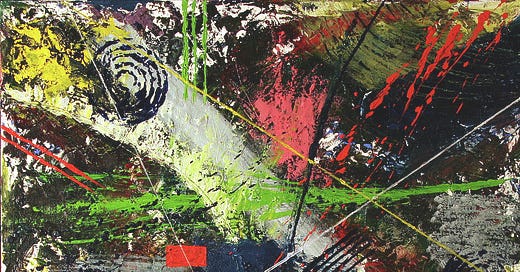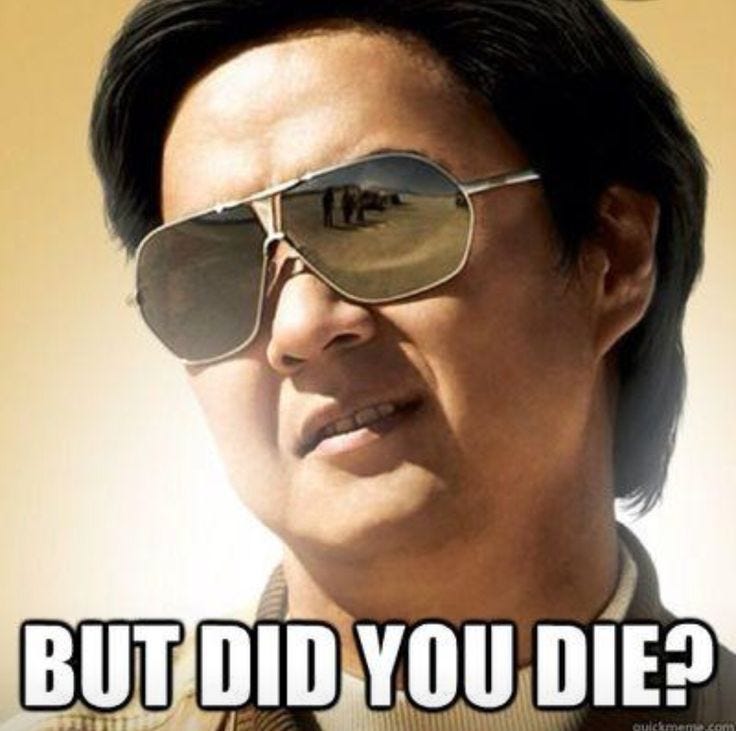Just a Hunch: Part One
On Synchronicities, Intuition, Nursing, Gambling, and Other Cosmic Ideas
My wife is a believer in synchronicities.
I guess I am, too. At least now.
It’s a fascinating idea, one that challenges my typically stubborn acceptance, yet also something that touches on a vague belief in the looping cosmic infinity enveloping us all.
Anyway, my wife loves Carl Jung and believes that time is irrelevant. We likely exist on a virtual plane where something in our present has already occurred thousands of years ago, and then will repeat in another thousand years.
In other words, someone a million light years away is ALSO not reading this post.
(And yes, if time is irrelevant, then I probably shouldn’t use “years” as a way of measuring it.)
I don’t experience as many synchronicities as my wife. Or, at least if I do, I don’t remember them. (I’ve suffered my share of concussions. Plus, my daughter reminds me I’m really old.)
On a related note, I often forget why I walked into my garage (usually to find some tool, since I break a lot of things). I also had to text myself this anecdote before I forgot.
I’ve probably always experienced synchronicities in some form, but I didn’t know they had a name. I should clarify: I asked Grok.
Jung defined synchronicity as “the simultaneous occurrence of a certain psychic state with one or more external events which appear as meaningful parallels to the momentary subjective state” (Synchronicity: An Acausal Connecting Principle, 1973, p. 8).
I love this definition, especially the bounty of beautiful and absurd phrases. “External events” and a “momentary subjective state” are wonderful, existential ideas that are somehow grounded in barefoot human nature.
I think we’re all capable of experiencing such phenomena. I tell my wife that some people are probably more fine-tuned to receive such messages. Certainly, openness to divergent ideas is a critical qualifier.
One of my wife’s brilliant qualities (there’s a lot to pick from) is that she possesses an exceptional ability to experience events that are inexplicably linked.
Or in the words of the Grateful Dead, “Once in a while, you get shown the light/In the strangest of places if you look at it just right.”
When she asks for a sign, she usually gets it.
Naturally, synchronicities are linked to molecules of faith and God. I like to believe God is the energy flowing through everything, from big, dumb humans to the tiniest scrap of bacteria. It’s a weirdly comfortable thought that we are but a varying degree of atoms in a simulation we can never understand.
Unless you’re a Boomer. The universe begins and ends with them.
It’s a heady concept that is beautiful in its impossibility, and one that our monkey brains can’t help to define in relatable terms.
I’ve always experienced deja vu, which I now understand as both a biological and metaphysical, sometimes spiritual glitch. Using Jung’s framework, I find comfort in these experiences—often they remind me that things are unfolding as they should.
Further, I’ve grown to learn that synchronicities and deja vu are extensions of intuition, or as I like to call them “hunches.”
Referring to these events as “hunches” or “gut feelings” puts a dumb guy spin on something that is wildly unknowable.
Here’s another great definition.
Intuition, in Jung’s psychological framework, is one of the four primary functions of consciousness (alongside thinking, feeling, and sensation). He described intuition as a perceptive process that grasps possibilities, patterns, and meanings beyond sensory data or logical reasoning (Psychological Types, 1921, CW 6, par. 770-772).
Certainly, some people (like my wife) are better wired to possess and be able to utilize intuition. Just like synchronicities, evolved intuition comes from a person’s sense of openness, but also has to reflect a collective shared energy that shapes experience.
In my life, I think I’ve best applied intuition in three areas, one of which is completely superficial. The other two involve keeping human beings alive.
Everyone’s a dumbass when it comes to parenting—at least at some point. Similarly, it seems like everyone has advice on how to best do it. A sizable chunk of this advice is either rampantly unscientific, detrimental or complete bullshit given the source.
The best parenting advice steals from Ralph Waldo Emerson: “Trust thyself.”
Unless you’re a complete asshole. In which case, practice the Constanza method and do the opposite.
My rule of thumb was always asking, “Is this safe?” I extended this framework to nursing, adding “will this kill somebody?”
For the uninitiated, general hospital nursing is a chaos similar to waiting tables, except there’s a bigger chance one of your diners will stroke out.
Just like parenting, all new nurses are dumbasses until they gain experience. Luckily enough, in a less acute setting (think most places outside a busy trauma emergency department), it turns out it’s really difficult to actually kill a patient.
The difference between new nurses can be a comparison in Meyers-Briggs personality types (another of my wife’s favorites). The ones who thrive on chaos and dopamine-chasing action (ESTP or ESFP) gravitate to Emergency Department and Critical Care roles. The truly sick ones become flight nurses.
For the record, a nurse who writes a Substack on neurodivergence typically does NOT fall into this group.
The kind of nurse who wants to avoid everything listed above is likely more of an INTJ or even INFJ. I include myself in this group. These types prefer order and routine and need time and space to rationalize decisions.
I believe the key distinction is “F” (Feeling) versus “T” (Thinking). The “feelers” want to chase the rush of saving someone’s life. The “thinkers” just want to survive a non-eventful shift.
Of course, both involve intuition. And because nursing is an infinitely hard job, both types tend to eventually burnout. That’s when you try to land an “outpatient” nursing spot, where you become more specialized, and have more time to develop dumb theories.
My wife made a pretty spectacular nurse, because she could mix feeling and thinking and use her intuition to make quick, sometimes life-saving decisions (think a busy, understaffed government hospital). Yet her best gifts were exhibited later in a Hospice setting.
Hospice nursing is decidedly an INFJ field (Editor’s Note: I originally used ISFJ instead of INFJ…an error my wife did not enjoy). The thrill seekers and ambulance chasers would be bored out of their minds. However, the “feelers”, especially those most in tune to experience synchronicities, are capable of connecting with the eerily collective intuition that accompanies dying.
She has better stories, but I have a few of my own. In short, I’ll just say that the dying’s intuition can be impeccably fine-tuned, leading to extraordinary occurrences. The way people die is often mesmerizing, especially when they have a reason to live.
The intuitive symmetry of dying is remarkable. Patients will rattle breaths barely three times a minute for days, never opening their eyes to grasp their situation. Then, once a long lost relative appears or a significant date is reached (usually anniversaries), the person acquires the intuition to know that it’s time to die.
This happened a lot with older patients who had been married for decades. It’s a beautiful synchronicity to link a loving couple’s last earthly moments together before they meet again on some existential plane.
I’m not sure what synchronicities lie in awkward transitions, but let’s find out.
The third way I use intuition is completely unnecessary, brings out my less-desired competitive impulses and is a thousand percent self-serving.
I gamble on football.
Because I am an INTJ, I should clarify that this is not the kind of gambling where you chase twenty bets from your phone, alternate between exhilaration and rock bottom and constantly run the risk of causing critical marital strife.
My kind of gambling is much better than that.
You drop a hundred bucks at the beginning of the year, then you make weekly picks (a combination of NFL and college). All picks are one point, except for your “essay” pick, which is worth three.
Meaning you write a short essay describing your thinking behind the pick. The essays can range from technical explanations (“the Falcons always cover”) to more creative ones involving conspiracies, political and social events.
You rack up points throughout the football year, then if you’re good enough, you reach the “playoff” stage. There, if you get hot, you just might win it all.
Two years ago, I won it all. There’s enough people in the pool to make it a nice chunk of money. I built a greenhouse with my winnings (then I tore it down and built a “better” one—another of my neurodivergent compulsions and a story for another time.)
There are dozens of strategies on how to bet on football, usually proclaimed by a thousand hucksters, of whom maybe 0.5% might be “okay” gamblers.
There are mainly three types of bettors. The first can be loosely identified as “public” bettors, meaning fans riding some dumb, emotional swing. These are the bettors Las Vegas loves, because they are super easy to manipulate.
For an example, if a team is coming off a big win (this immediately rules out the Browns), the point spread is set to lure bettors thinking they’re about to get an easy win. Then, the lines get adjusted accordingly and a few days later, they break their TVs.
The second type of bettor is good at math. Or “numbers”, if you need a quick dumb guy explanation of Analytics, which can be just about anything. They are essentially a thousand different data points on teams, players, situations, internal and external influences.
Just like their dumber, emotional cousins, Analytics can produce an ugly barrage of betting hucksters. Instead of primal “my team is better than yours”, the argument is backed by data. “New York’s QB struggles in the fourth quarter in outdoor settings” versus “historically, West Coast teams traveling east cover only 25% of the games played in the last ten years.”
Of the two, I prefer analytics. However, my biggest successes have come using intuition.
I.e., a hunch.
“I just have a feeling that game isn’t going to be close”, or “the Eagles are due to lose.” There’s some collective intuition behind these predictions, but unscientifically, they are just gut feelings.
And it works.
Until it doesn’t.
At least until I forget that intuition is my best strategy, which I do about twenty times a year. Then, I dip into analytics and make bad justifications, instead of feeling out which collective public sentiment is wrong.
And then I lose.
“Trust thyself” is great for parenting and nursing. Not so much when you’re trying to find a 48-point underdog you think can cover.
But I digress.
Clearly, my intuition leads me to write lengthy and rambling introductions. I never did get to my main topic, which involves consuming versus creating. That will come in PART TWO.
Or a thousand years from now.
It doesn’t really matter, anyway.
Time is a flat circle.






Well, that was certainly an entertaining soup of ideas! My husband believes in synchronicity, or he has done since he won £650 on an accumulator at York races. I don't see the signs myself, although he points things out to me, I tend to forget, even if they sound interesting an plausible. For the record, I'm an INFJ which is apparently the MB personality of choice for despots and dictators worldwide. I think my husband would agree. Anyway, this was very entertaining and I look forward to more of your stuff.
This was an interesting piece to read.
I definitely believe in synchronicities but I don't seem to have a good intuition (and for that I think I'm thankful because my possible thoughts tend to be negative).
Or maybe I do and I don't see it 🤷🏽♀️